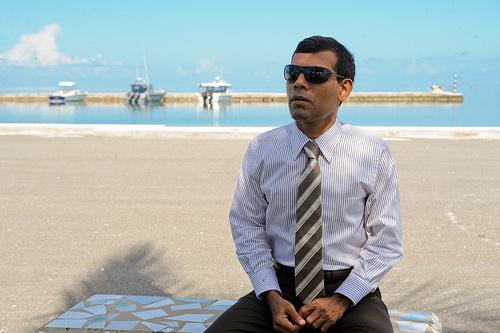Tuesday, we told you that Mohamed Nasheed, president of the climate change-threatened Maldives, stepped down from his office. Wednesday, it became clearer that he was forced to step down — at gunpoint. Tuesday, his aides said that Nasheed was being held against his will and his party, the Maldivian Democratic Party, called the move to oust him a “coup d’etat.”
On Wednesday, Nasheed was able to meet with supporters and, according to the BBC, told reporters: “I was forced to resign at gunpoint. There were guns all around me and they told me they wouldn’t hesitate to use them if I didn’t resign.”
Protesters in the Maldives had been clamoring against Nasheed’s arrest of a judge who had ordered the release of a government critic.
Nasheed has worked as president to raise awareness of climate change issues and the threat it posed to his nation and others. The climate campaigners have rallied to support him: Tuesday night, 350.org asked supporters around the world to tell their leaders to “put diplomatic pressure not the leaders of this coup to avoid violence and work for a peaceful, democratic solution to their conflict.” 350.org’s message said that Nasheed “has been one of 350.org’s strongest allies, and friends, for many years” and that “he needs your support to ensure his safety.”
The climate writer Mark Lynas, who was Nasheed’s climate change adviser for the past two years, wrote in the Guardian:
Those governments of the world that do value democracy and the rule of law should not be under any illusions about what has just taken place. The former dictator Gayoom and his forces never accepted the outcome of the 2008 elections, and their networks of power and influence were increasingly threatened by Nasheed’s campaign against corruption in the judiciary. Indeed, this crisis was sparked by the arrest of senior court judge who had repeatedly refused to prosecute corruption cases in order to protect powerful allies from the former regime.”



